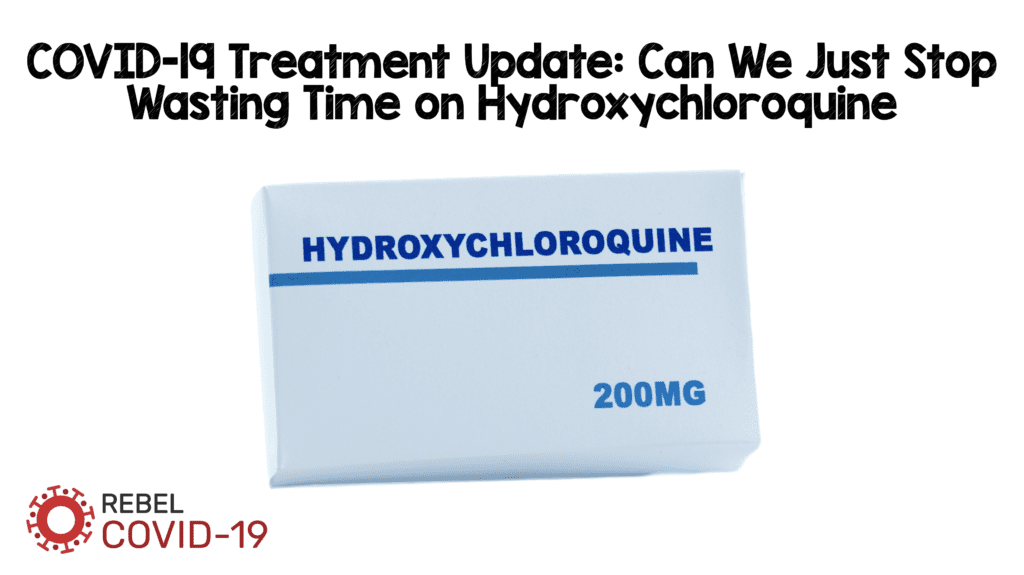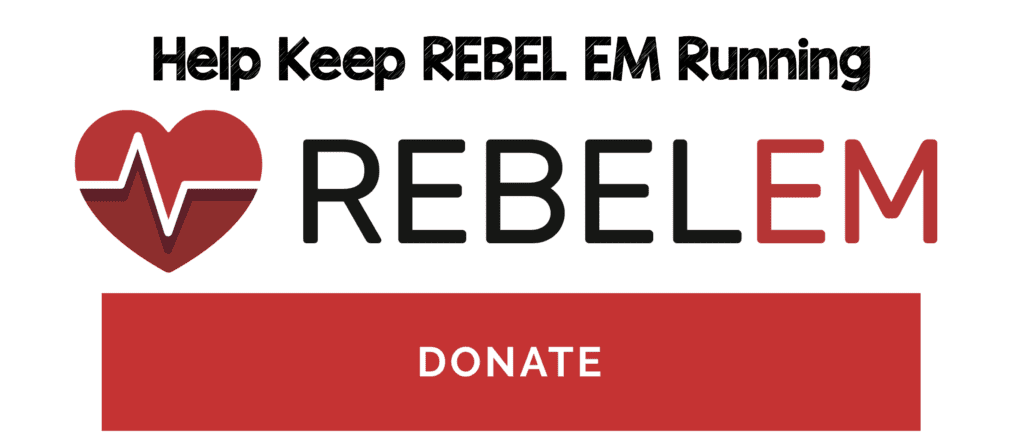
 Background: Hydroxychloroquine (HCQ) is an antimalarial and immunomodulatory drug that is postulated to exert an antiviral effect by increasing intracellular pH resulting in decreased viral binding at the ACE2 receptor.
Background: Hydroxychloroquine (HCQ) is an antimalarial and immunomodulatory drug that is postulated to exert an antiviral effect by increasing intracellular pH resulting in decreased viral binding at the ACE2 receptor.
Azithromycin is a macrolide antibiotic that also has anti-inflammatory and immunomodulatory properties which could help decrease viral replication and viral binding.
Both of these medications have been used to treat COVID patients based on in vitro findings. However, in vitro studies often do not extrapolate to patient oriented outcomes.
In June 2020 the US FDA revoked the prior emergency use authorization to HCQ and chloroquine (CQ) in patients with COVID-19. We now have yet another retrospective observational trial of HCQ, azithromycin, and the drugs in combination.
Paper: Arshad S et al. Treatment with Hydroxychloroquine, Azithromycin, and Combination in Patients Hospitalized with COVID-19. International Journal of Infectious Diseases 2020. [Epub Ahead of Print]
Clinical Question: Is hydroxychloroquine (HCQ) alone and in combination with azithromycin (AZM) in hospitalized patients positive for COVID-19 associated with a reduction in in-hospital mortality?
What They Did:
- Multicenter, comparative retrospective observational study performed at 6 hospitals in southeast Michigan
- HCQ 400mg BID for 2 doses on day 1, followed by 200mg BID on days 2 – 5
- AZM 500mg qD on day 1 followed by 250mg qD for the next 4 days
- Combination of two drugs was reserved for selected patients with severe COVID-19 and minimal cardiac risk factors
- QTc >500ms was considered an elevated cardiac risk and HCQ use was reserved for patients with severe disease and telemetry monitoring for serial QTc checks
- Hospital protocols included adjunctive immunomodulatory therapy with corticosteroids and tocilizumab
Outcomes:
- Primary: In-hospital mortality
Inclusion:
- ≥18 years of age
- Treated as inpatient for at least 48 hours unless expired within 24 hours
- First admission only for patients with multiple admissions
Exclusion:
- Not discharged from hospital
- Left against medical advice
- Transferred to another healthcare facility
- Readmission
Results:
- 2,541 patients
- Overall in-hospital mortality was 18.1% (45% in ICU patients)
- 24% of patients required ICU care
- 18% of patients required mechanical ventilation
- Median time to follow up was 28.5d
- 9% of patients had not been discharged at the time of analysis
- 68% of patients received methylprednisolone
- 5% of patients received tocilizumab
-
In-Hospital Mortality
- HCQ + AZM: 20.1% (95% CI 17.3 to 23.0%)
- HCQ Alone: 13.5% (95% CI 11.6 to 15.5%)
- AZM Alone: 22.4% (95% CI 16.0 to 30.1%)
- Neither Drug: 26.4% (95% CI 22.2 to 31.0%)
- P<0.001
- No patient had documented torsades de pointes
- Hazard Ratios of Medication vs Neither Medication:
- HCQ Alone fs Neither Medication: HR 0.34; 95% CI 0.254 to 0.455
- AZM Alone vs Neither Medication: HR 1.050; 95% CI 0.682 to 1.616
- HCQ + AZM vs Neither Mecication: HR 0.294; 95% CI 0.218 to 0.396
- Cox regression model using neither drug as reference:
- Treatment with HCQ alone decreased mortality by a HR of 66% (p<0.001)
- Treatment with HCQ + AZM decreased mortality by a HR of 71% (p<0.001)
- Matched propensity scoring of HCQ vs no HCQ (190 patients in each group):
- Treatment with HCQ vs no HCQ decreased mortality by a HR of 51% (p<0.009)
Strengths:
- Consecutive patients hospitalized with COVID-19 from March 2020 until May 2020
- Treatments were protocol driven and uniform in all hospitals
- Reviewed all deaths to mitigate any potential limitations associated with missing or inaccurate documentation in EMRs
Limitations:
- All patients were kept on cardiac monitors throughout the course of treatment to monitor for prolonged QTc. This may not be feasible in some hospitals that are currently overwhelmed by a surge of COVID-19 patients (i.e. not enough monitors). Additionally, these results could lead to indication creep with clinicians wanting to treat outpatients (i.e. without QTc monitoring)
- Unclear why some patients received certain treatments and others did not
- Retrospective, non-randomized, non-blinded study design
- Duration of symptoms prior to hospitalization are not available
- This was a select group of patients without cardiac risk factors
- Groups were not well balanced at baseline which can bias results
- No medication group was older which an independent risk factor for death
- More steroids given in the HCQ group (78.9%) and HCQ+AZM group (74.3%) compared to AZM alone (38.8%) and neither med group (35.7%). See discussion section on the RECOVERY trial and dexamethasone
- Unblinded study which could lead patients getting medications to have unmeasured improved care
- This study an only establish association, not causation
Discussion:
- This retrospective observational study with all of its methodological issues does not replace what we know from the well-done RECOVERY trial randomized clinical trial. In the pyramid of evidence-based medicine, an RCT is methodological superior trial compared to this trial. The RECOVERY trial looking at HCQ, out of the UK, which is a large randomized clinical controlled trial showed no beneficial effect of HCQ in patients hospitalized with COVID-19. In this trial 1542 patients were randomized to HCQ and 3132 patients were randomized to usual care alone. There was no significant difference in the primary endpoint of 28d mortality (25.7% vs 23.5% respectively).
-
Another arm of the RECOVERY trial out of the UK randomizing patients to dexamethasone vs no dexamethasone showed profound 28d mortality benefit favoring steroids:
- Patient requiring invasive mechanical ventilation: NNT = 9
- Patients requiring oxygen support without invasive mechanical ventilation = 29
- As most patients in this trial receiving HCQ or HCQ + AZM received steroids and the patients receiving AZM alone or neither therapy had far fewer patients receiving steroids, the likely mortality benefit of this trial is due to the steroids and not the HCQ or HCQ + AZM
- There was minimal cardiovascular disease in this trial with only 8.7% of patients having reported cardiovascular disease
- There were more patients requiring ICU level of care and mechanically ventilated in the HCQ and HCQ+AZM groups. As this group has the highest mortality, we would expect to see more of a mortality benefit as their overall mortality was simply higher compared to the AZM alone and no drug groups
- More patients received steroids in the HCQ and HCQ+AZM groups compared to the other two groups, which can confound the results
Author Conclusion: “In this multi-hospital assessment, when controlling for COVID-19 risk factors, treatment with hydroxychloroquine alone and in combination with azithromycin was associated with reduction in COVID-19 associated mortality. Prospective trials are needed to examine this impact.”
Clinical Take Home Point: This methodologically flawed study, with unbalanced use of steroids simply bias the results to favor patients receiving HCQ and HCQ + AZM. This study should not change clinical practice of not prescribing these medications.
References:
- Arshad S et al. Treatment with Hydroxychloroquine, Azithromycin, and Combination in Patients Hospitalized with COVID-19. International Journal of Infectious Diseases 2020. [Epub Ahead of Print]
Post Peer Reviewed By: Anand Swaminathan, MD (Twitter: @EMSwami)
The post COVID-19 Treatment Update: Can We Just Stop Wasting Time on Hydroxychloroquine appeared first on REBEL EM - Emergency Medicine Blog.


